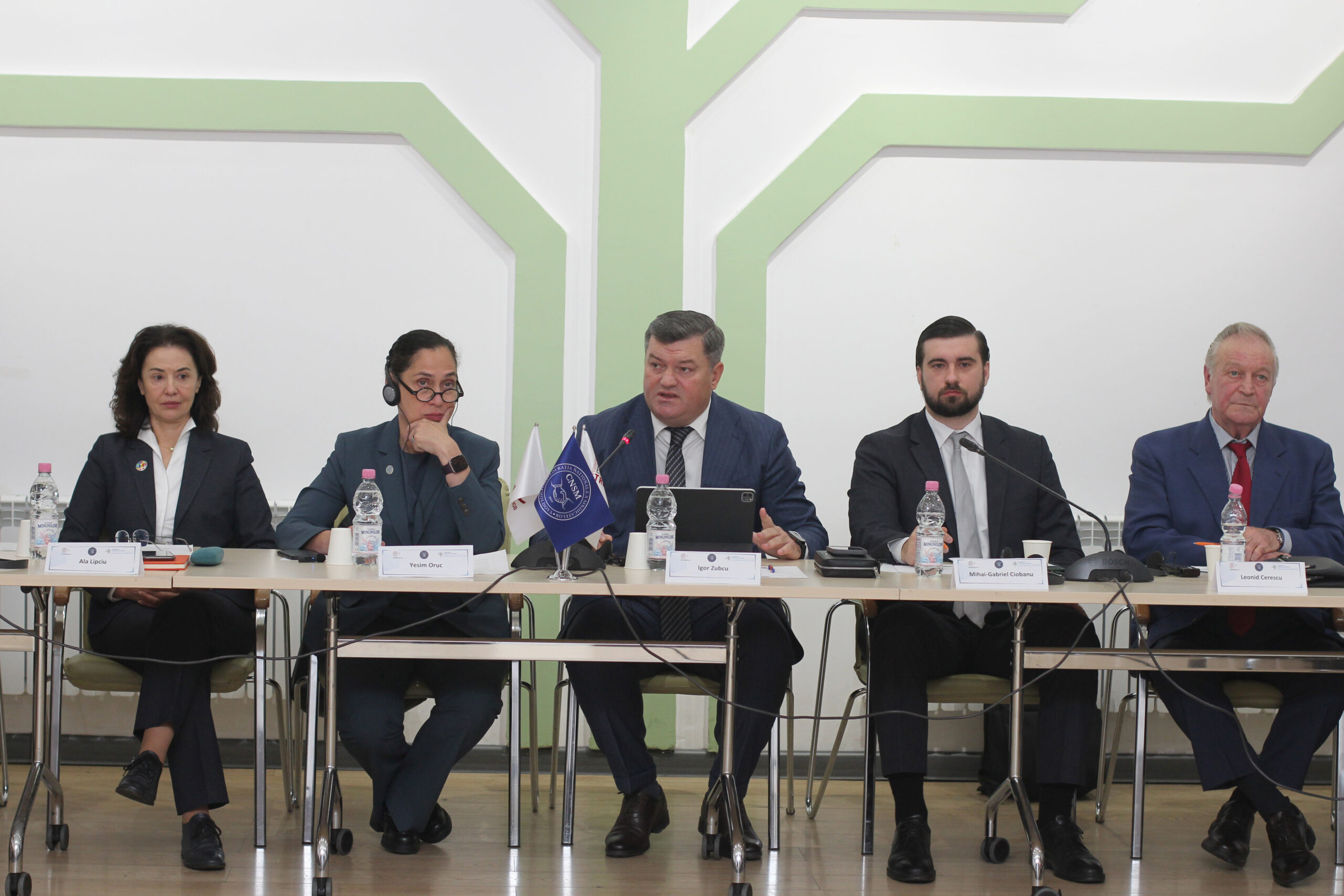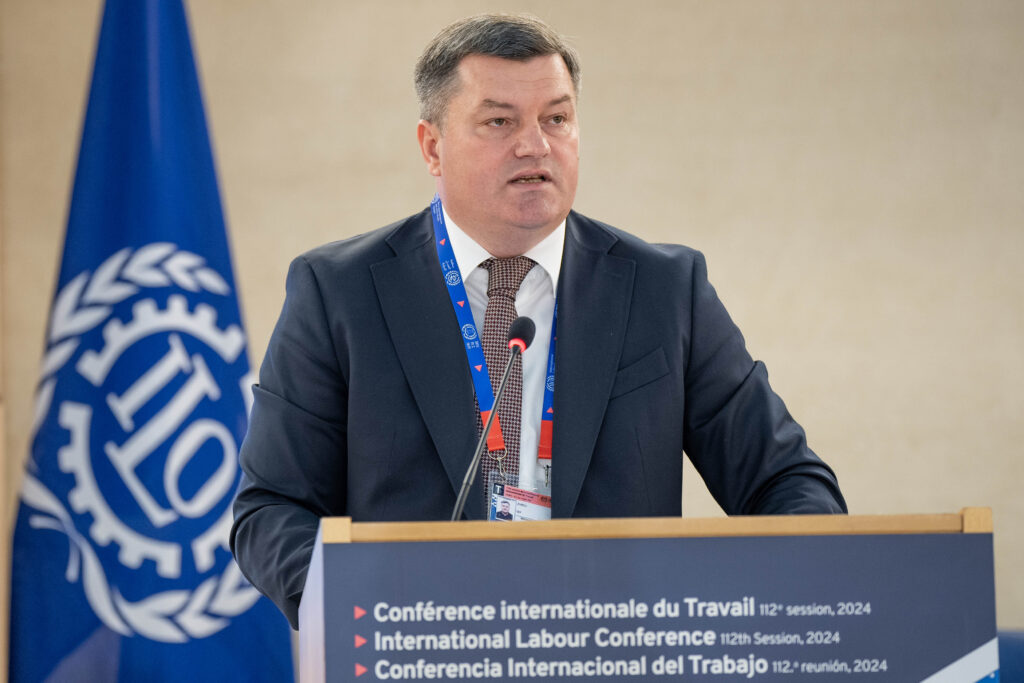The National Trade Union Confederation of Moldova (CNSM), in partnership with the EU-Moldova Civil Society Platform and the Danish Trade Union Development Agency (DTDA), organized today, Tuesday, October 7, 2025, a high-level roundtable dedicated to the World Day for Decent Work.
The event, held at the Labour Institute in Chișinău, brought together representatives from the Government, employers’ associations, the United Nations, the International Labour Organization (ILO), and other institutions to address major challenges facing the labor market in the Republic of Moldova.
A central topic of the discussions was the urgent need to ensure decent work for digital platform workers, who carry out their activities via online platforms. The event’s agenda included debates on topics such as:
- The current state of the labor market in Moldova and challenges for employees;
- EU Directive 2024/2831 on improving working conditions in platform work and how it can be applied in Moldova;
- Examples of good European practices in protecting digital platform workers;
- The role of trade unions and labor inspectorates in defending workers’ rights.
Igor Zubcu, President of CNSM, emphasized that “platform workers often operate under non-transparent conditions, lacking legal clarity and therefore deprived of essential rights such as paid leave, daily and weekly rest, a guaranteed minimum wage, job stability, and social protection.”
“Currently, millions of workers in the European Union work through digital platforms — such as those in delivery, transportation, or online services. Many of them are classified as self-employed, even though their relationship with platforms is actually one of employment. Moldova is no exception — transformative processes are changing how people work, but should not lead to workers being stripped of the rights guaranteed by labor law,” Zubcu stated.
“For us, the trade unions, workers’ rights and dignity at the workplace are essential, and we will make every necessary effort to ensure they are respected for all workers, regardless of their form of employment or the digital transformations taking place,” the trade union leader stressed.
The following guests spoke at the event: Yeşim Oruç, UN Resident Coordinator in the Republic of Moldova, Mihai-Gabriel Ciobanu, State Secretary at the Ministry of Labour and Social Protection, Leonid Cerescu, President of the National Confederation of Employers of Moldova; Ala Lipciu, National Coordinator of the International Labour Organization, Valentin Roșca, Deputy Ombudsman, Dumitru Costin, President of the National Trade Union Bloc (Romania), etc.
The topic of implementing EU Directive 2024/2831 on improving working conditions in platform work was addressed by: Tea Jarc, Confederal Secretary of the European Trade Union Confederation, Daniel Cruz Fuentes, Head of Digital Analysis and Transformation at CCOO (Spain), Victor Ballester Alarcón, Representative of the Labour Inspectorate of Catalonia (Spain), Dumitru Costin, President of the National Trade Union Bloc (Romania).
Speakers who addressed challenges in ensuring decent work for platform workers included: Sergiu Sainciuc, Vice-President of CNSM, Vladislav Caminschi, Executive Director of the National Confederation of Employers of Moldova, Elena Țîbîrnă, General Director of the National Social Insurance House, Ion Dodon, General Director of the National Health Insurance Company, Raisa Dogaru, Director of the National Employment Agency, Liliana Staver, National Coordinator of the JWCPW Project, Head of the Research, Development and Innovation Department, Academy of Economic Studies of Moldova.
During the discussions, it was highlighted that many platform workers operate in non-transparent conditions, often misclassified as self-employed, even though their work is under the control of the platform. This misclassification deprives them of fundamental rights, such as a guaranteed minimum wage, paid leave, and social protection.
In this context, Moldova reaffirmed its commitment to transpose EU Directive 2024/2831 into national legislation by December 2026. The directive introduces a legal presumption of an employment relationship and sets strict requirements on the use of algorithms and the protection of workers’ personal data.
Attention was also drawn to the preferential tax regimes (e.g. for IT park residents or taxi drivers), which, while beneficial in the short term, undermine long-term access to social insurance benefits (like pensions and allowances) and create inequalities and unfair competition.
There was also discussion about the development of a future ILO Convention that would enshrine fundamental rights — such as social protection, occupational safety and health, and freedom of association — for platform workers at the international level.
The leadership of CNSM reiterated that the current minimum wage in Moldova does not cover the basic needs of workers and their families. CNSM calls on the Ministry of Labour and Social Protection to resume dialogue on reviewing the minimum wage, drafting and adopting an Action Plan to promote collective bargaining, increasing the coverage rate of employees through collective agreements, and transposing EUDirective 2022/2041 on adequate minimum wages in the EU.
The event reaffirmed the need to strengthen social dialogue between trade unions, employers, and authorities in order to promote decent work as a pillar of sustainable development and social justice.
Celebrated annually on October 7, at the initiative of the International Trade Union Confederation (ITUC), the World Day for Decent Work is a moment for global trade union mobilization to raise awareness about the challenges workers face and the need for people-centered public policies. Decent work means: fair wages, safe working conditions, access to social protection, respect for trade union rights, and equal opportunities for all.
The topic for 2025: “Democracy delivering social justice and prosperity for all!”
You can view more photos from the roundtable organized by CNSM on the occasion of the World Day for Decent Work on their Facebook page: www.facebook.com/sindicate.md

